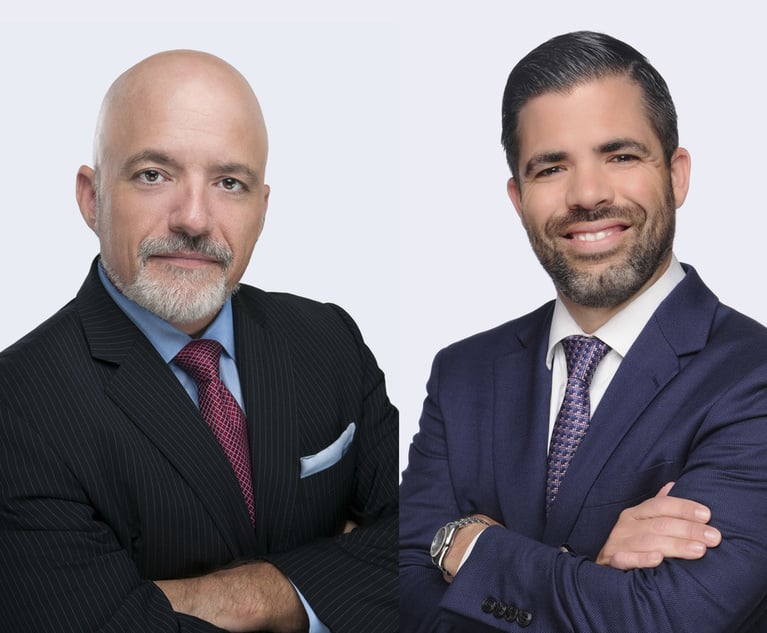Legal Directories Abound. Which Ones Help Your Firm the Most?
The internet has created an overabundance of legal directories, many aimed at generating advertising revenue through sponsored positions, ads and expanded listings.
March 05, 2019 at 09:01 AM
5 minute read
 Don Silver, COO of BoardroomPR.
Don Silver, COO of BoardroomPR.The internet has created an overabundance of legal directories, many aimed at generating advertising revenue through sponsored positions, ads and expanded listings. Why? More than one in four consumers find an attorney through online legal directories, according to a Clio's Legal Trend Report. Another third search the web for an attorney.
Legal directories expend time and money to push their results to the first page of search engine results in hopes of funneling prospective clients through their websites. The more referrals they generate, the more money they can make from selling premium access to those eyeballs.
Avvo ranks fourth and Lawyer.com fifth among the ways people looking for legal help find it, according to a 2018 online survey by ReviewTrackers. Google finished first, followed by Yelp and Facebook.
Are those two legal directories the best, or just the most popular? Avvo ranks in the top 2,000 websites in the nation. It generates 1.6 million monthly inquiries, according to SEMrush. That's a lot of potential clients in one place.
Along with having attorneys answer consumer and business questions, the site offers reviews and the Avvo score, which pleases some attorneys and annoys others. While layperson evaluations may not be accurate, they are popular due to their widespread use online. Three in five people surveyed by iLawyerMarketing valued Google reviews the most, followed by Facebook and Yelp.
Law firms and attorneys can spend a lot of time and money putting themselves atop the listings of directories. A Miami law firm with 10 attorneys would spend $9,000 on a yearly contract for a prime listing on Findlaw.com. A Statewide Authority Package on lawyer.com starts at $12,000 per year.
Which brings us to the question, why list—and likely pay for prominent exposure—in a legal directory? It's the Yellow Pages of the 21st century, the modern way to make your name known. While more than 60 percent of clients come from referrals, nearly all of those people and businesses will look you up online before hiring you.
Finding directories is easy. Getting a good deal is becoming more difficult. One company owns Martindale-Hubbell, lawyers.com, Ngage, and Avvo. Thomson Reuters owns LawInfo, FindLaw and Super Lawyers. That leaves a handful of respected sites such as lawyer.com, and it has no free listings.
Thus, you must resign yourself to paying to play in the legal directory world if you want more than a basic listing buried on the last page of a website or search engine result. What you pay and how you structure your contract varies widely, from prominent listings to pay-per-click programs similar to those on Google AdWords.
Why bother? Because the benefits extend beyond having your smiling face in an ad. By the way, a seeing the lawyer's photo is one of the seven most important reasons people choose an attorney, according to the iLawyerMarketing survey.
The online value comes from the directories themselves and how the search engines value them. Google and Bing highly respect the top directories. Advertising on a respected directory puts you in good company, which boosts the search-engine ranking of your website. The search engines also see that you're listing yourself in the right place on the web. While that may seem obvious, it matters.
Consumers feel the same way. If you're in the same directory as attorneys they know and respect, they perceive you as equally legitimate.
Reviews in legal directories matter, because the more good ones you have, the more credible you are. Be careful, though. If directories and search engines discover that you and 10 of your colleagues are stuffing your profile with five-star reviews, you'll be penalized.
The rest of the benefits come from what you make of your listing. Write smart articles that people like and share, and search engines will reward your website with a higher ranking. Provide valuable answers to legal questions on sites such as Avvo, and you will receive high marks.
When you're solicited for advertising in a legal directory, start by seeing whom among your respected competitors and legal connections is advertising. If you find only a few, that's a sign that the directory lacks credibility.
Remember, it's not enough for attorneys to be listed. A number of directories copy entire state bar listings and post them. Others publish incorrect information that's easily spotted because the law firm names, attorney affiliations and addresses are out of date.
Ask the kinds of questions your clients would ask you: How many years has the directory been operating? What results has it produced for an attorney practicing in your field in your market?
Examine the testimonials of two or three lawyers you know. Are they accurate? Do they seem genuine or were they manufactured to make the attorney seem more successful?
When you see a paid listing of a noncompeting attorney you know well, call her or him and ask: Is the ad producing results? Are you happy with the quality of service? Are you seeing a good return on your investment?
Only after you have done your homework should you consider talking to a directory's sales representative. And just as your clients probably did before they hired you, shop around.
Don Silver is COO of Boardroom Communications, a statewide PR and integrated marketing agency. He co-leads the firm's busy crisis communications and online reputation management practice group. Silver can be reached at 954-370-8999 or [email protected].
This content has been archived. It is available through our partners, LexisNexis® and Bloomberg Law.
To view this content, please continue to their sites.
Not a Lexis Subscriber?
Subscribe Now
Not a Bloomberg Law Subscriber?
Subscribe Now
NOT FOR REPRINT
© 2025 ALM Global, LLC, All Rights Reserved. Request academic re-use from www.copyright.com. All other uses, submit a request to [email protected]. For more information visit Asset & Logo Licensing.
You Might Like
View All
Trending Issues in Florida Construction Law That Attorneys Need to Be Aware Of
6 minute read


Trending Stories
- 1AIAs: A Look At the Future of AI-Related Contracts
- 2Litigators of the Week: A $630M Antitrust Settlement for Automotive Software Vendors—$140M More Than Alleged Overcharges
- 3Litigator of the Week Runners-Up and Shout-Outs
- 4Linklaters Hires Four Partners From Patterson Belknap
- 5Law Firms Expand Scope of Immigration Expertise Amid Blitz of Trump Orders
Who Got The Work
J. Brugh Lower of Gibbons has entered an appearance for industrial equipment supplier Devco Corporation in a pending trademark infringement lawsuit. The suit, accusing the defendant of selling knock-off Graco products, was filed Dec. 18 in New Jersey District Court by Rivkin Radler on behalf of Graco Inc. and Graco Minnesota. The case, assigned to U.S. District Judge Zahid N. Quraishi, is 3:24-cv-11294, Graco Inc. et al v. Devco Corporation.
Who Got The Work
Rebecca Maller-Stein and Kent A. Yalowitz of Arnold & Porter Kaye Scholer have entered their appearances for Hanaco Venture Capital and its executives, Lior Prosor and David Frankel, in a pending securities lawsuit. The action, filed on Dec. 24 in New York Southern District Court by Zell, Aron & Co. on behalf of Goldeneye Advisors, accuses the defendants of negligently and fraudulently managing the plaintiff's $1 million investment. The case, assigned to U.S. District Judge Vernon S. Broderick, is 1:24-cv-09918, Goldeneye Advisors, LLC v. Hanaco Venture Capital, Ltd. et al.
Who Got The Work
Attorneys from A&O Shearman has stepped in as defense counsel for Toronto-Dominion Bank and other defendants in a pending securities class action. The suit, filed Dec. 11 in New York Southern District Court by Bleichmar Fonti & Auld, accuses the defendants of concealing the bank's 'pervasive' deficiencies in regards to its compliance with the Bank Secrecy Act and the quality of its anti-money laundering controls. The case, assigned to U.S. District Judge Arun Subramanian, is 1:24-cv-09445, Gonzalez v. The Toronto-Dominion Bank et al.
Who Got The Work
Crown Castle International, a Pennsylvania company providing shared communications infrastructure, has turned to Luke D. Wolf of Gordon Rees Scully Mansukhani to fend off a pending breach-of-contract lawsuit. The court action, filed Nov. 25 in Michigan Eastern District Court by Hooper Hathaway PC on behalf of The Town Residences LLC, accuses Crown Castle of failing to transfer approximately $30,000 in utility payments from T-Mobile in breach of a roof-top lease and assignment agreement. The case, assigned to U.S. District Judge Susan K. Declercq, is 2:24-cv-13131, The Town Residences LLC v. T-Mobile US, Inc. et al.
Who Got The Work
Wilfred P. Coronato and Daniel M. Schwartz of McCarter & English have stepped in as defense counsel to Electrolux Home Products Inc. in a pending product liability lawsuit. The court action, filed Nov. 26 in New York Eastern District Court by Poulos Lopiccolo PC and Nagel Rice LLP on behalf of David Stern, alleges that the defendant's refrigerators’ drawers and shelving repeatedly break and fall apart within months after purchase. The case, assigned to U.S. District Judge Joan M. Azrack, is 2:24-cv-08204, Stern v. Electrolux Home Products, Inc.
Featured Firms
Law Offices of Gary Martin Hays & Associates, P.C.
(470) 294-1674
Law Offices of Mark E. Salomone
(857) 444-6468
Smith & Hassler
(713) 739-1250






